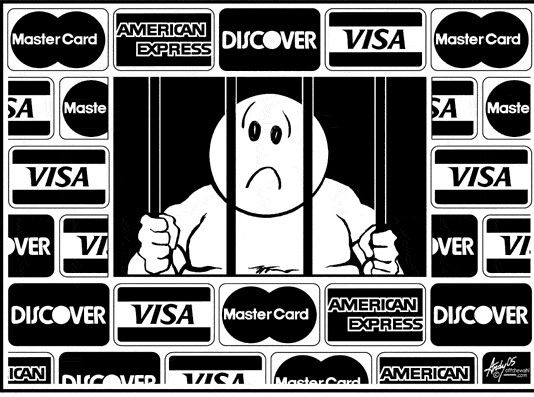
Debt collection businesses are one of the most complained
about businesses, they are third party businesses that work with lenders to
collect their debts. A lender for example a bank, cannot wait for the whole
term of the loan to collect the repayments as this would reduce their liquidity.
Instead they sell the promissory notes to third party for example the Federal
Reserve to generate immediate cash and the debt that was already in their
books, effectively gets settled when they receive money for the promissory note
that the borrower gave to them.
The money from the borrower however still needs to be
collected in theory and since lending institutions cannot be bothered to wait
that long, they sell their debts to debt collecting agencies. These debt
collection agencies purchase the debts from lenders at a discounted price and
then use their own means to collect payments from the borrowers.
What many people do not realize that these debt collectors
do not have a fair ground to stand upon in the court of law and if borrowers
are aware of their rights and some intricacies of the law then they can very
easily not only argue their case but also emerge victorious.
The first step that a debt collector will take is to send you a claim of the debt that you owe. At this point you as a borrower have three main choices
- Reject the claim and ignore it
- Accept it and pay
- Accept it and return it with a counter claim
Let us look at the consequences of each of these choices first.
If you decide to ignore the claim then it will expire within a few days (10 days) and if you do not respond to the claim then the court will rule in favor of the debt collector by default. This is not the most sensible court of action.
If you decide to accept
the debt collection claim and repay the debt, then that is your own choice
but remember that once again this is not the most sensible choice because there
is a way, using the law that you can get out of this tricky situation because
your original debt was discharged. Technically the debt doesn`t even exist
because the lenders sell the promissory notes when they securitize their debts.
The third option is going to be the subject of this
discussion. If you receive a claim for debt then you have roughly 10 days to
respond to it. Within these 10 days you need to accept it and return it to the debt collector with a counter claim.
This counter claim will then have 30 days and the burden will now be on the
debt collector to respond to the counter claim.
What is a counter claim?

A counter claim is a claim made by a defendant in a legal
action. It is a claim made to offset a prior claim. It is a way of giving the
creditor or the debt collector more time to consider the fact of the matter.
Why should the creditor or debt collector be given some time to consider it?
However, it is not necessary that a debt collector withdraw
his claim. In that case it is important to understand the legal grounds upon
which the counter claim has to be constructed.
As we mentioned before, a counter claim provides additional facts to the debt collector to consider before proceeding. If it has already reached the court then the borrower can ask the court time for discovery.
What is Discovery?
“Discovery” is a procedure that happens before the trial
begins. Each party can request the court to obtain evidence from the other
party through discovery devices. So, if the claim for debt isn`t settled
administratively, it is entered into the court and proceedings begin.
Grounds for Counter Claim
Debtors or borrowers must understand the bare facts first. Suppose a borrower mortgaged their house and in order to create a mortgage the borrower and sent a promissory note to the lender, which is basically a promise to pay the amount due in future.
That promissory note is a negotiable instrument but the
lender cannot technically negotiate it. Because if the lender sells the note
for cash, then the promissory note issued by the borrower/debtor stands
discharged, the liability in the books is discharged and the borrower no longer
owes any amount to the lender. For the note to be used as a legal tender, it
has to be registered with a lien and the security on it needs to be perfected,
then only can it be used as a legal tender. Mostly, this is not done and many
borrowers do not realize this either.
Furthermore, whatever mortgage payments are made by the
borrower from this point onwards, are in fact a liability for the lender and
asset for the borrower. You as a borrower, do not technically owe any money
because the lender has already exchanged your promissory note for liquidity.
But the reason that this system works is because the person or let us assume
that FED purchased the promissory note from the lender. So now FED is expecting
cash inflow from the repayments but you as a borrower do not owe anything to
the FED (unless the note was registered) . You owed your mortgage to your
lender and the bank has already settled your note when it was negotiated.
This is the basic ground for filing a counter claim, there are legal flaws here that can be used to get out of this situation. The aim of the counter claim is to look at the balance sheet of the lender. For the reason mentioned above, if the lender shows their Balance sheet in the court, it will become apparent that the original debt was discharged when the promissory note was exchanged.
Furthermore, assessing the balance sheet will also reveal
how much the lender owes to the borrower. So the counter claim is to ask for a
recoupment or an offset.
Lending institutions make use of legal loopholes to exploit
borrowers and if you as a borrower are aware of these loopholes and your
rights, then you can use the same system to claim back your rights. This is not
difficult; it only needs us to be aware of the law and our rights.
Counter claim defenses
The counter claim should now be based on the following
defenses.
Revocation of the
contract
Since the original contract is of a very deceptive nature,
it should be revoked if the lender refuses or does not provide full access to
the books, documents and relevant accounting records. According to the Truth in
Lending Act, any contract can be revoked if proper disclosure has not been
provided. Mortgages may be exempt from this option, however if the lender has
initiated foreclosure proceedings then they are no longer exempt and thus the
borrower/debtor can use the defense that the lender stated incurred amount of
the mortgage, as the original debt had already been discharged.
Request records of
the lender in discovery
Doing this, as we mentioned above will reveal the fact that
in reality, it is the lender who owes liability to the debtor. This will create
the grounds for an offset. Some of the
records that should be requested are:
- FR 2046 balance sheet,
- 1099-OID report,
- S-3/A registration statement,
- 424-B5 prospectus and
- RC-S & RC-B Call Schedules
Debt Collector
cannot claim the property
The promissory note issued by the borrower, is a legal
tender and it becomes an asset for the mortgage originator. The originator or
the institution that created the mortgage, becomes an entitlement holder in the
asset and can claim it if the borrower fails to repay the debt. The debt collector
on the other hand, does not have any right to lay any claim or ask for
repayments.
Lender cannot sell
an unregistered note
The promissory note created by the borrower is unregistered
unless the borrower secures it by a maritime lien on a prepaid trust account
registered on a UCC. If the note is not registered then it simply cannot be
negotiated and thus if the lender negotiated it, then it counts as a violation
and provides the right of rescission.
Conclusion
If you ever get a claim from a debt collection agency, there
is no need to worry. You do not have to pay anything to the debt collection
agency because they are not even the legal party to the original contract that
happened between you and your lender, however, you do need to provide the
proper response/rebuttal and do so within a timely manner. All it requires is a
little knowledge of the relevant laws to file a counter claim and here at
ZeroPoint University you will obtain all the knowledge and resources needed to
help you take action!



